Key takeaways:
- Engaging with local politicians fosters accountability, transparency, and shapes community priorities.
- Researching political figures enhances discussions and builds confidence in advocacy efforts.
- Effective communication requires clarity, active listening, and follow-up to maintain relationships.
- Sharing experiences and narratives can inspire community action and strengthen collective engagement.
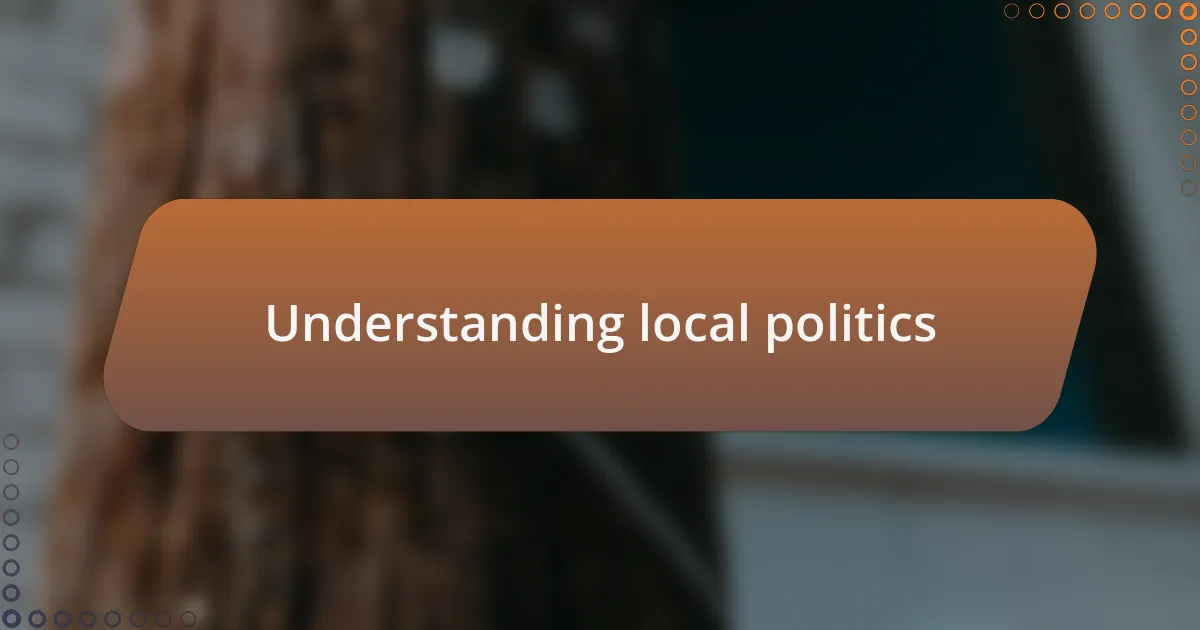
Understanding local politics
Local politics can often feel like a maze, where every twist and turn reveals something new about the community. I remember my first encounter with a town hall meeting; it was crowded, buzzing with energy, and I couldn’t help but feel a mix of excitement and anxiety. How often do we overlook the power of local governance in shaping our daily lives?
Understanding the intricacies of local politics requires a willingness to engage with the community. I once chatted with a neighbor who was deeply passionate about a local environmental issue. Listening to her perspective not only educated me but also made me realize how easily we can become passive observers. Isn’t it fascinating how a single conversation can spark a desire to contribute more actively?
Moreover, I find it enlightening to observe how local leaders respond to community concerns. During a recent budget meeting, I witnessed passionate debates over funding for schools versus public parks. It left me wondering: do we really know what matters most to our neighbors? These local discussions remind me that every voice counts, and our collective input can lead to meaningful change.
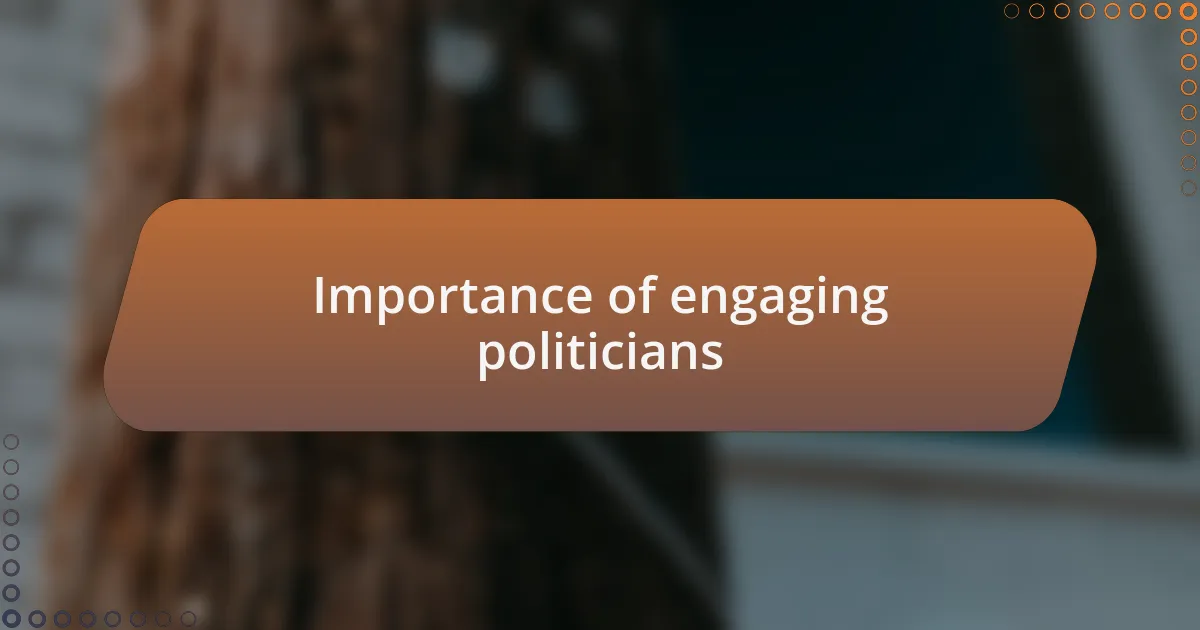
Importance of engaging politicians
Engaging with politicians at the local level is crucial for fostering accountability and transparency. I recall a community forum where a council member addressed questions about a recent policy change. It struck me how much more relatable and approachable they seemed when we spoke directly about our concerns. Why wouldn’t we seize these opportunities to ensure our voices are heard?
Another aspect I’ve come to appreciate is how engagement can shape priorities and funding. I remember attending a city council session where residents shared stories about the dire need for improved public transportation. The palpable urgency in the room influenced the decision-makers and demonstrated that citizens can indeed drive policy direction. Isn’t it empowering to think that by speaking up, we can actually shape our community’s future?
Lastly, the bonds formed through political engagement cannot be understated. I’ve met incredible individuals, each with unique perspectives, who share a commitment to making our neighborhood better. While initially daunting, these interactions have often turned into collaborations for community projects. Doesn’t it feel satisfying to know that together, we can not only amplify our concerns but also inspire real change in our local landscape?
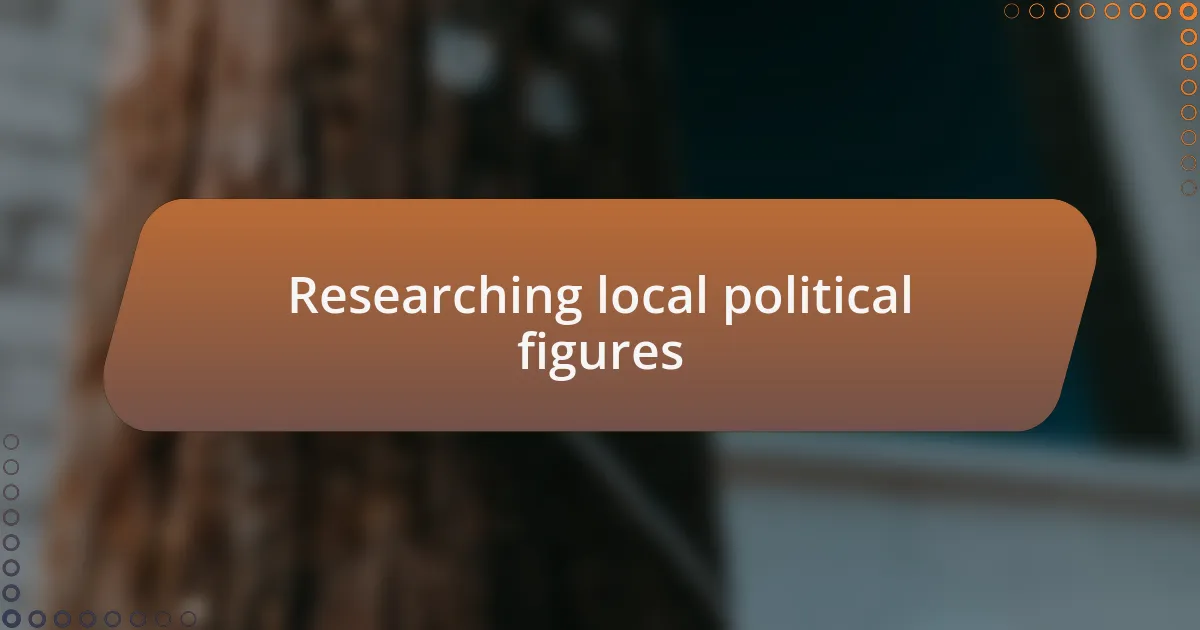
Researching local political figures
Researching local political figures is an essential step in understanding the dynamics of community governance. I remember the first time I Googled a council member’s background—discovering their professional history and community ties gave me a newfound respect for their role. It’s fascinating how that knowledge can transform our conversations; knowing their priorities helps tailor our discussions to encourage meaningful dialogue.
Delving deeper into their positions and voting records can be eye-opening as well. I once combed through a local politician’s past initiatives and realized they championed environmental policies that resonated with me. This insight made it easier to approach them about supporting more green spaces in our city. When you genuinely understand where they stand, it creates a bridge for more fruitful conversations.
Additionally, attending town hall meetings or following local news can enrich your perspective on what truly matters to your community leaders. I vividly recall an event where a resident boldly challenged a politician on a contentious issue. The exchange wasn’t just informative; it highlighted the importance of being prepared and knowledgeable. How often do we think about the power of asking the right questions? Engaging with our local political figures through research not only equips us with facts but also cultivates confidence in our advocacy efforts.
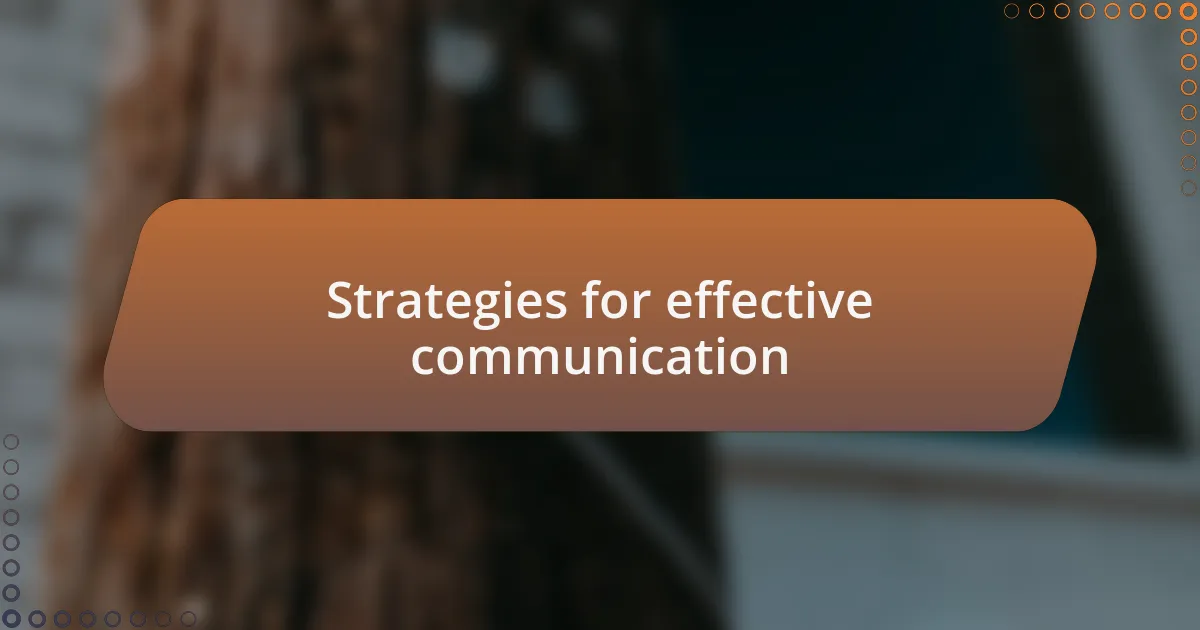
Strategies for effective communication
Effective communication with local politicians requires clarity and respect. When I first reached out to a city council member, I made a list of key points I wanted to discuss. I learned that if I articulated my thoughts concisely, it showed that I valued their time and opinions. In those instances, I found being straightforward led to deeper, more impactful exchanges.
One strategy I employed was active listening. After voicing my concerns about public transport, I made sure to listen carefully to their responses, which often contained valuable insights. It’s amazing how much you can learn when you listen more than you speak. Have you ever noticed how a simple nod can encourage a politician to share more? This behavior fosters an atmosphere of collaboration, making it easier for both sides to connect.
Additionally, following up after conversations can reinforce important points. I remember crafting a brief email summarizing our discussion about community parks and adding a link to a petition I started. This small effort not only kept the dialogue alive but also demonstrated my commitment to the issue. Wouldn’t you agree that building on communication is key to creating lasting relationships with political figures? Maintaining that connection can lead to greater advocacy and community involvement in the long run.
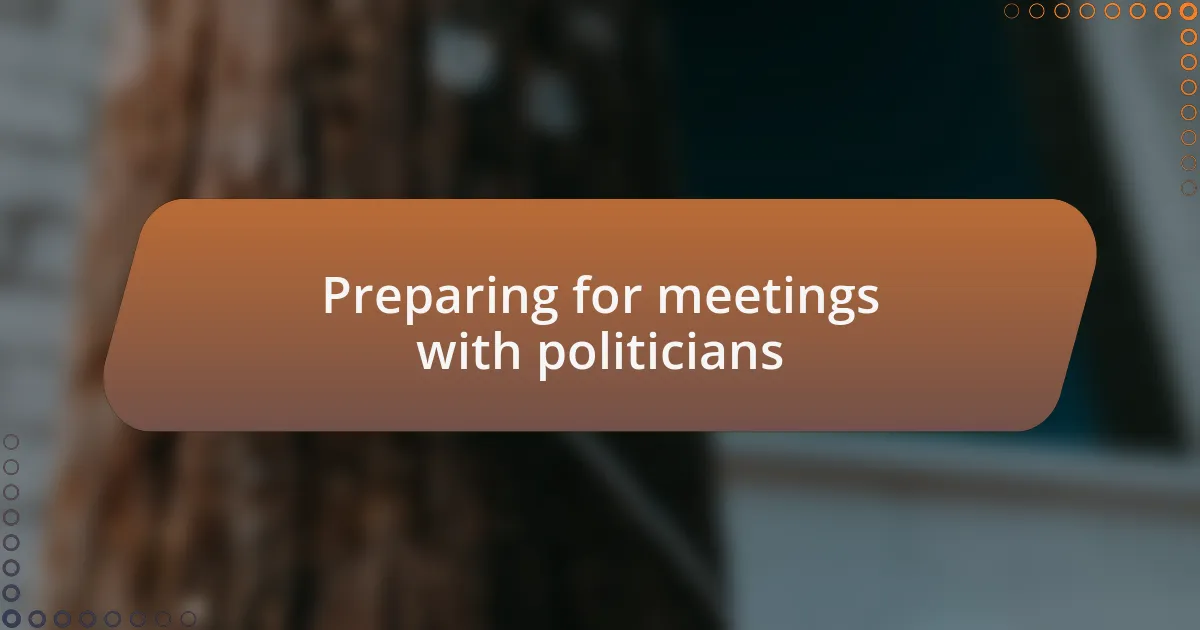
Preparing for meetings with politicians
When preparing for meetings with politicians, I find that research is crucial. Before my first meeting with a local councilor, I spent hours reviewing their background, recent initiatives, and community concerns. This knowledge not only helped me formulate relevant questions but also demonstrated genuine interest. Have you ever noticed how politicians light up when you reference their recent accomplishments? It’s a great way to build rapport.
Creating an agenda is another effective tactic. I remember drafting a brief outline of topics I wanted to discuss, which included specific issues affecting my neighborhood. This approach kept our conversation focused and productive. Plus, I was surprised by how much the councilor appreciated having a clear framework. Wouldn’t you agree that it shows respect for their time when you come prepared?
On the actual meeting day, I believe in practicing mindfulness to manage nerves. I often take a few deep breaths, reminding myself of my goal: to advocate for my community. Feeling slightly anxious is natural, but grounding myself helps me express my thoughts authentically. Have you ever walked into a meeting feeling unprepared? It can be overwhelming, but with the right preparation, I always leave more confident and empowered.
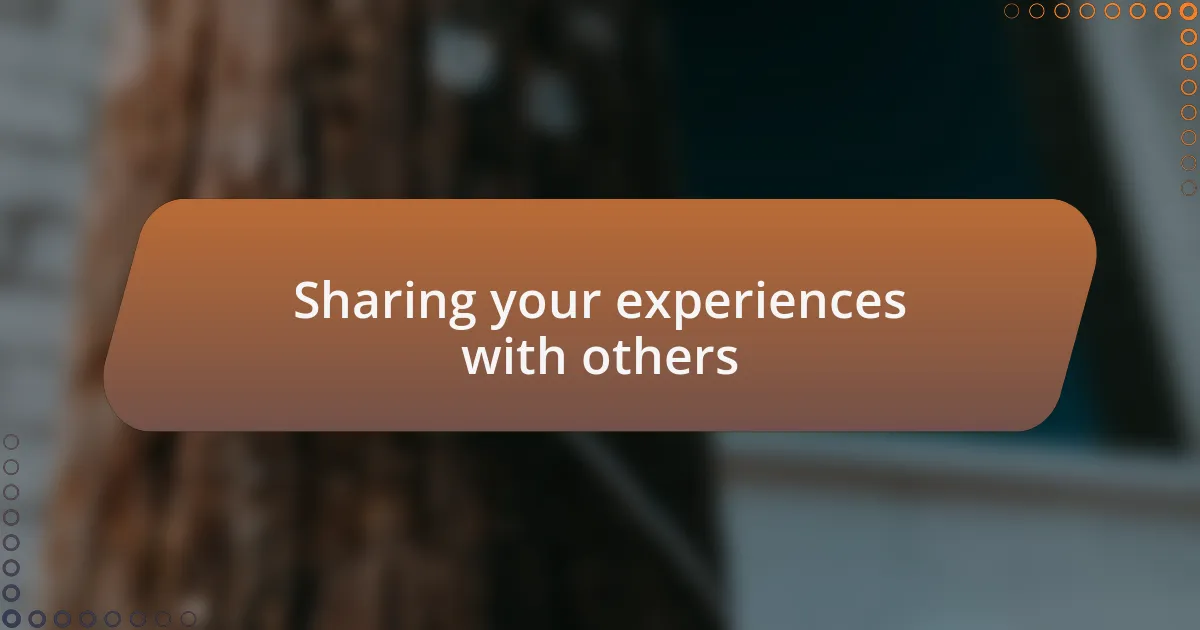
Sharing your experiences with others
When I shared my experiences of engaging with local politicians, I realized how powerful storytelling can be. For instance, after attending a town hall meeting, I recounted my experience to friends and neighbors over coffee, discussing the politician’s response to our concerns. It was heartening to see how sharing that narrative sparked interest and dialogue about what we could do as a community.
I often encourage others to start their own conversations about political issues they face. One time, I spoke at a community event, detailing how I approached my local representatives and the strategies that worked for me. I felt invigorated when others shared their stories afterward, creating a space where we collectively brainstormed solutions. Isn’t it amazing how one story can inspire action in others?
Additionally, I’ve found that sharing my experiences online amplifies our collective voice. After a particularly impactful meeting, I posted about it on social media, highlighting not only the issues we discussed but also the progress we made. The responses flooded in, with people thanking me for the insights or adding their own thoughts. It showed me that our community is listening and willing to engage, proving that when we share our journeys, we can unite and transform our neighborhoods together.
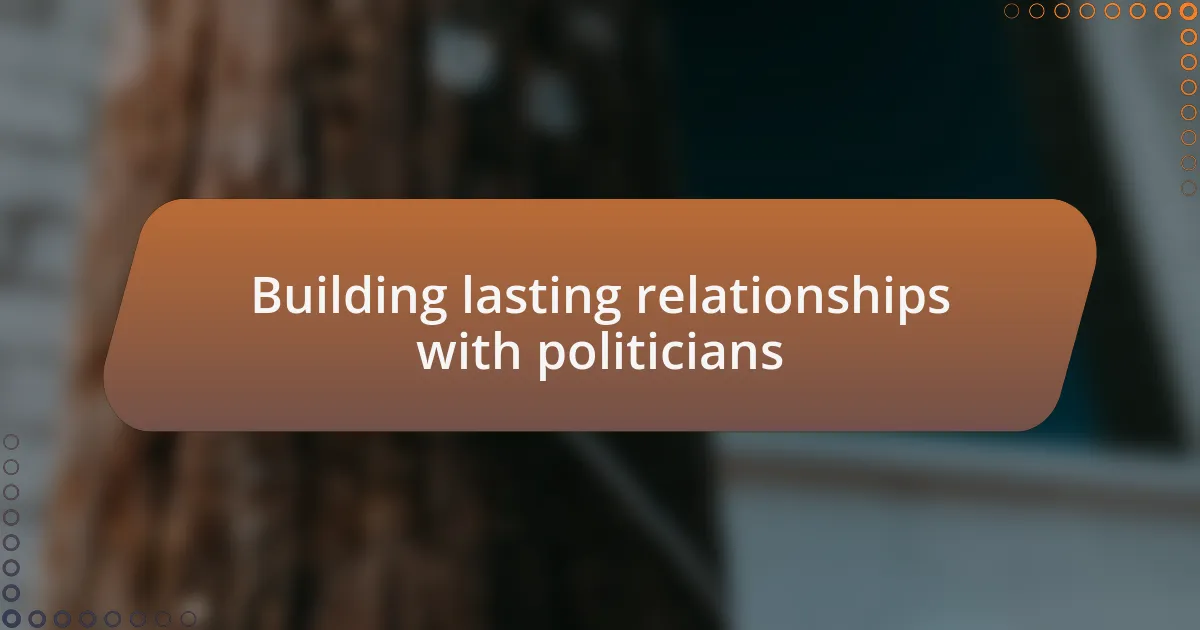
Building lasting relationships with politicians
Building lasting relationships with politicians requires more than just attending events; it’s about fostering genuine connections. I remember a time when I volunteered for a local campaign, not just to support a candidate but to understand the issues he championed. Through countless conversations, I learned the importance of finding common ground, which laid the foundation for a rapport that felt genuine and authentic.
Often, I’ve found that following up after discussions can deepen these connections. For instance, after a lively debate on environmental policies, I made it a point to send a thoughtful email to the politician, expressing appreciation for his insights and sharing my thoughts on future initiatives. This small act of acknowledgment helped transform a brief encounter into an ongoing dialogue that proved beneficial for both parties.
Investing time in local events also offers unique opportunities to connect on a personal level. I vividly recall attending a community barbecue where a local official was present. Striking up a casual conversation over grilled food and shared laughter made it easier to discuss serious topics later on. Isn’t it fascinating how informal settings can break down barriers and foster trust between constituents and their representatives? These moments matter and create an environment where both sides feel seen and heard.